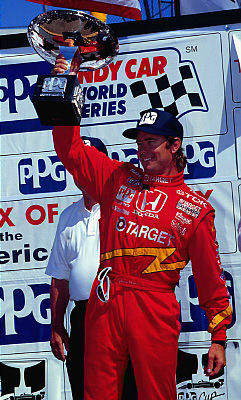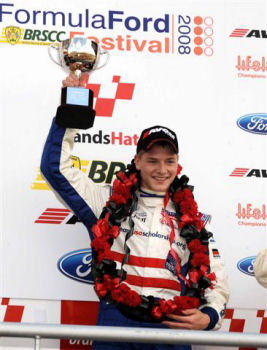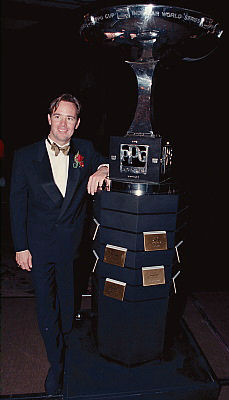The Way It Is/ Swimming against the tide
by Gordon Kirby Most of us are painfully aware that thirty years have passed since Mario Andretti scored the last Grand Prix win by an American driver and that other than Michael Andretti's frustrating flirtation with F1 in 1993 and Scott Speed's passing acquaintance in 2007, Grand Prix racing has been free of American drivers over most of the last twenty years.
Most of us are painfully aware that thirty years have passed since Mario Andretti scored the last Grand Prix win by an American driver and that other than Michael Andretti's frustrating flirtation with F1 in 1993 and Scott Speed's passing acquaintance in 2007, Grand Prix racing has been free of American drivers over most of the last twenty years.
But it's not just F1 that's devoid of American content these days. Over a similar period of time we've witnessed a sharpening decline in the quantity and quality of American talent in both Indy car and domestic sports car racing. Until Emerson Fittipaldi won the CART title in 1989 Indy car racing had never witnessed a foreign champion other than Italo-Englishman Dario Resta who won the first formal AAA championship and the Indy 500 back in 1916. But beyond the appearance of Jim Clark and a few other F1 drivers at the Indy 500 and some odd USAC races during the mid-sixties, Indy car racing remained an entirely American preserve for almost eighty years.
When CART broke away from USAC in 1979 the only foreign driver in the field was Aussie Vern Schuppan who was joined in 1981 by fellow Australian Geoff Brabham and Mexican rookie Josele Garza. The first foreign driver to make his name in Indy car racing was Teo Fabi who finished second to Al Unser Sr. in the 1983 CART series, driving a factory/Forsythe March. Fabi was on the pole at Indianapolis that year and the little Italian won four races, but the next foreign driver in CART points in '83 was Geoff Brabham way down in 21st place.

© LAT USA
Into the nineties, Fittipaldi continued to lead an increasing number of foreign drivers into Indy car racing. The overseas invasion really hit its sride in 1993 when Nigel Mansell quit F1 as the defending world champion to spend two years racing Indy cars with Newman/Haas. Mansell became CART's second foreign champion in '93 leading Fittipaldi and a young Paul Tracy in a non-American sweep of the top three places in the championship. Six of the top ten in points in '93 were foreigners and eleven of CART's regular starters that year were non-Americans.
Al Unser Jr. took the CART title for America again in 1994 and Jimmy Vasser won the CART championship in '96, but Vasser would be the last American to win the CART or Champ Car title. Over the past twelve years Indy car racing has seen a sharp decline in the number of competitive American drivers. Canadian Jacques Villeneuve won both the Indy 500 and the CART championship in '95 and after Vasser all the remaining CART or Champ Car champions were foreigners. These were: Alex Zanardi (1997 and '98), Juan Montoya ('99), Gil de Ferran (2000 and '01), Cristiano da Matta (2002), Paul Tracy (2003) and Sebastien Bourdais (2004-'07).
Al Jr. and Michael Andretti followed Rick Mears, Bobby Rahal and Danny Sullivan as America's last great Indy car drivers. But Unser lost his job with Penske at the end of 1999 and went off to the IRL while Andretti retired at the end of '02. Michael finished third in CART's 2000 series and was the only American in the top ten in points. Jimmy Vasser and Andretti were seventh and ninth in points in 02, CART's final year, and Vasser was the only American driver to run all the races in '03 under the Champ Car banner.
Jimmy finished eleventh in Champ Car points in '03 and for the first time the top ten places were swept by foreign drivers from Canada, Brazil, Mexico, France, Spain and the UK. During Champ Car's five years of existence the only American drivers to win any races were A.J. Allmendinger, who won no fewer than five times in 2006 before trying to make his fortune in NASCAR, and Ryan Hunter-Reay who won at Surfers Paradise in '03 and Milwaukee in '04.
Of course, one of Tony George's founding tenets when he created the IRL in 1996 was that his series would create a path to the top for home-brewed talent. There appeared to be some truth to George's theory during the IRL's early, staggering years as Tony Stewart won the 1997 IRL championship before jumping to NASCAR with Joe Gibbs, and Greg Ray and Buddy Lazier won the 1999 and 2000 IRL titles before Sam Hornish won two championships in a row in 2001 and '02 with Panther Racing.

© Jeff Bloxham
Kiwi Scott Dixon won the '03 IRL title with Ganassi's team from Brazilians Gil de Ferran, Helio Castoneves and Tony Kanaan. In '04, Kanaan beat Brit Dan Wheldon to the IRL championship with third-placed Buddy Rice the only American among the top six. Wheldon beat Kanaan to the '05 title before Hornish came back in '06 to win his third IRL championship plus the Indy 500, this time with Penske. In '07 Dario Franchitti won the Indy 500 and IRL title followed by Dixon, Kanaan and Wheldon with Hornish the top American in sixth place ahead of Castroneves.
Best American in this year's IndyCar series was Danica Patrick who finished a distant sixth in points ahead of a disappointing Marco Andretti and Ryan Hunter-Reay. Three Americans won IRL races this year as each of Patrick, Hunter-Reay and Graham Rahal were able to win single races. Other Americans to race regularly in the IRL this year were '04 Indy 500 winner Buddy Rice, Ed Carpenter and AJ Foyt IV.
The situation is no better in America's pair of dueling sports cars series. The only Americans to race top-class LMP1 or P2 cars in the ALMS in 2008 were Scott Sharp, Patrick Long, Chris Dyson and Butch Leitzinger. Sharp was able to contend for wins and the championship thanks to some superb driving by teammate David Brabham and Long continues to do clean, quick work for Penske and Porsche. But again, the American content is pretty thin compared to the '70s and '80s when Al Holbert and Peter Gregg took five championships apiece and respectively won 49 and 41 races.
The Grand-Am series is a little stronger in domestic talent with veteran Scott Pruett winning the championship with Memo Rojas from Alex Gurney and Jon Fogarty. Gurney and Fogarty won last year's Grand-Am title and are classic examples of talented American racers who have been ill-served by the sport. Both raced successfully in the Atlantic series a few years back--Fogarty twice won the championship--but neither was able to move up and their careers languished until Bob Stallings hired them to drive his Grand-Am cars.
In fact, Gurney's story says it all. He's fast, tough-minded, a race winner and champion with an outgoing personality, a keen mind and a wide, Gurney-like grin. Alex may not be Ayrton Senna or Michael Schumacher, but he's pretty darned good with a legendary racing name. Yet he was ignored by the team owners and powers-that-be in CART, Champ Car and IRL. Sadly, that type of thinking has reaped the results it deserves.

© LAT USA
Much of the apparent shortage of American driving talent is the product of the longterm lack of leadership for both American open-wheel and road racing and the gratuitous lip-service paid over so many years to building a ladder system. One of CART's failures was to make Formula Atantic, Indy Lights and Super Vee fight for their respective pieces of turf rather than imposing an order and sensible plan to tie them together into a proper ladder system. Instead, CART's leaders played politics while NASCAR built a system and blew American open-wheel racing into the weeds.
One of many reasons for NASCAR's success is that over the decades the France family painstakingly built a true ladder system from top to bottom. Today, NASCAR's first division Sprint Cup series is supported by the second-division Nationwide series and the third-level Truck series. Below the trucks there's the Whelen Weekly Series, which includes eight divisions across the country, and below that are eight more regional grass roots championships for a variety of front-engined, tube-frame cars. All these series nurture the sport by building a strong base of NASCAR tracks and fans and producing a steady stream of new stars like Kyle Busch, Carl Edwards and Joey Logano.
Nothing remotely like NASCAR's ladder system exists in either American open-wheel or road racing. Over the years I've watched the sad demise of a handful of useful young American driver development programs that I was fortunate to be involved with, including Skip Barber's Big Scholarship, the Team Green Academy and the Red Bull Driver Search. A number of well-meaning efforts like these have come along and then vanished because of the sport's stunning lack of leadership.
Mazda deserves credit for its efforts in supporting young talent through the Atlantic and Star-Mazda series. I also give Jeremy Shaw great credit for creating and pushing forward his Team USA. Shaw's Team USA bankrolls a couple of promising young American drivers to race each year in the UK's Formula Ford Festival or something roughly similar. Jeremy's program has been operating for nineteen years going back to 1990 when Jimmy Vasser was the scholarship's first choice. Today, Team USA enjoys generous support from many people in the American racing industry.
This year Team USA fielded two cars for Conor Daly and Josef Newgarden in the Kent engine division of last week's UK Formula Ford Festival at Brands Hatch. Daly, 16, is Derek Daly's son and the winner of this year's Skip Barber national championship. Daly's championship earned him a $350,000 bonus for a full Star-Mazda season next year. Newgarden, 17, finished second to Daly in the Barber series, won the season finale, and was the star of the Kent division at the Formula Ford Festival.
More than one hundred cars were entered for the featured Duratech race at Brands Hatch while the Kent division drew a solid field of forty cars. Newgarden shocked the Brits by setting the pace in practice and qualifying on the pole for the Kent race. He then scored a superb victory in the final driving away to win by 2.5 seconds and also turning the fastest lap. This was the 37th FF Festival and it's the first time an American has won any of the races, so it was a great achievement for young Newgarden. Daly also did a fine job, coming through from twelfth on the grid to finish sixth after suffering a broken throttle in qualifying. So it will be interesting to watch Newgarden's and Daly's careers unfold over the next few years.
Newgarden, Daly and Shaw's Team USA have shown there's American talent out there that deserves sponsorship and support. Newgarden's winning performance emphasizes that the top IRL and ALMS teams need to invest in young drivers like Joe Gibbs, Jack Roush, Richard Childress, Rick Hendrick and others have done in NASCAR. In recent years NASCAR's top teams have been actively searching for young drivers and putting them in development series like the Nationwide, Truck, or ARCA series and today they are reaping the rewards.
Clearly the talent has been flowing to NASCAR for some time. Jeff Gordon famously departed midget and sprint car racing for NASCAR eighteen years ago after trying without success to find an opening in Indy car racing. Tony Stewart graduated to the IRL from midget and sprint cars, but after winning the IRL championship in '97 he joined Gordon in NASCAR. Then there was a California dirt tracker named Jimmie Johnson who dreamed of following in the tire tracks of his hero Rick Mears and racing Indy cars. But with Indy car racing in decline and NASCAR on the rise, Johnson found his professional career in NASCAR.
As everyone knows, the last two years have seen a flood into NASCAR of former Indy or Champ car drivers. Juan-Pablo Montoya appears to have found a home in stock cars and has enjoyed some good races, but he's hardly a contender to win many races. Sam Hornish is there too with Roger Penske, but there's little more to say about Hornish's move from Indy car frontrunner to NASCAR mid-fielder. Dario Franchitti tried NASCAR, struggled, and has already returned to Indy cars, while the likes of Patrick Carpentier, A.J. Allmendinger, Michael McDowell and Scott Speed have learned, or are learning, that it's a long road from looking good in open-wheel cars to becoming a stalwart, let alone a star in NASCAR.
The struggles these fellows have encountered may stem the flow of open-wheel drivers to NASCAR, but the shortage of top-level American open-wheel and road racing talent will continue unless some serious attention is paid to shoring-up, organizing and promoting the disparate elements of the USA's ladder system. Without the required leadership however, this is a call to action that's sure to remain unanswered.
Auto Racing ~ Gordon Kirby
Copyright 2008 ~ All Rights Reserved
Copyright 2008 ~ All Rights Reserved
Top of Page